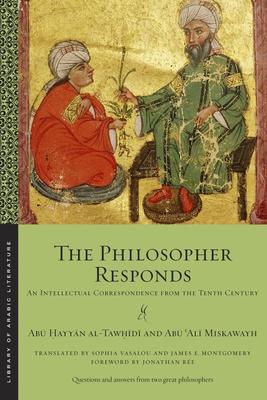Questions and answers from two great philosophers
Why is laughter contagious? Why do mountains exist? Why do we long for the past, even if it is scarred by suffering? Spanning a vast array of subjects that range from the philosophical to the theological, from the philological to the scientific, The Philosopher Responds is the record of a set of questions put by the litterateur Abū Ḥayyān al-Tawḥīdī to the philosopher and historian Abū ʿAlī Miskawayh. Both figures were foremost contributors to the remarkable flowering of cultural and intellectual life that took place in the Islamic world during the reign of the Buyid dynasty in the fourth/tenth century. The correspondence between al-Tawḥīdī and Miskawayh holds a mirror to many of the debates of the time and reflects the spirit of rationalistic inquiry that animated their era. It also provides insight into the intellectual outlooks of two thinkers who were divided as much by their distinctive temperaments as by the very different trajectories of their professional careers. Alternately whimsical and tragic, trivial and profound, al-Tawḥīdī's questions provoke an interaction as interesting in its spiritedness as in its content. An English-only edition.
Book
The Philosopher Responds: An Intellectual Correspondence from the Tenth Century
(Write a Review)
Paperback
$16.00
Questions and answers from two great philosophers
Why is laughter contagious? Why do mountains exist? Why do we long for the past, even if it is scarred by suffering? Spanning a vast array of subjects that range from the philosophical to the theological, from the philological to the scientific, The Philosopher Responds is the record of a set of questions put by the litterateur Abū Ḥayyān al-Tawḥīdī to the philosopher and historian Abū ʿAlī Miskawayh. Both figures were foremost contributors to the remarkable flowering of cultural and intellectual life that took place in the Islamic world during the reign of the Buyid dynasty in the fourth/tenth century. The correspondence between al-Tawḥīdī and Miskawayh holds a mirror to many of the debates of the time and reflects the spirit of rationalistic inquiry that animated their era. It also provides insight into the intellectual outlooks of two thinkers who were divided as much by their distinctive temperaments as by the very different trajectories of their professional careers. Alternately whimsical and tragic, trivial and profound, al-Tawḥīdī's questions provoke an interaction as interesting in its spiritedness as in its content. An English-only edition.Paperback
$16.00